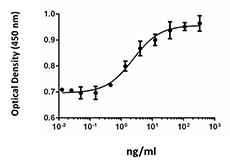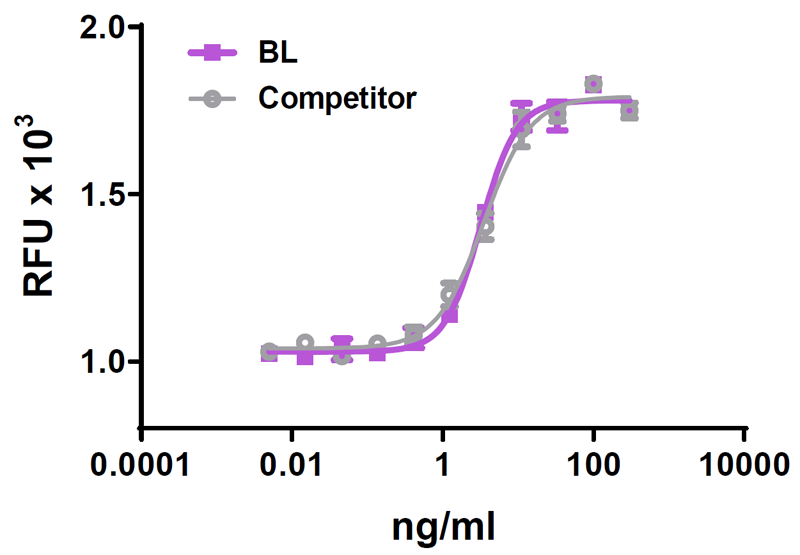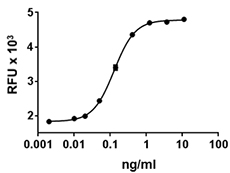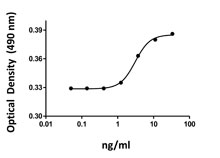- Regulatory Status
- RUO
- Other Names
- Keratinocyte growth factor, Fibroblast growth factor 7 (FGF-7), HBGF-7
- Ave. Rating
- Submit a Review
- Product Citations
- publications
| Cat # | Size | Price | Quantity Check Availability | Save | ||
|---|---|---|---|---|---|---|
| 711702 | 10 µg | 253 CHF | ||||
This product is not available for shipping outside of the United States.
KGF is a heparin binding growth factor secreted by cells of mesenchymal origin. KGF acts in a paracrine manner by binding exclusively to a splicing variant of FGF receptor 2, FGFR2-IIIB. FGFR-IIIB is predominatly expressed by epithelial cells. This suggests that KGF may play an important role in mesenchymal-epithelial communication. KGF can stimulate proliferation, migration, and differentiation of epithelial cells in a variety of tissues. In skin, KGF can be strongly upregulated in dermal fibroblasts after skin injury. KGF can induce keratinocyte proliferation and migration. KGF can also protect epithelial cells from reactive oxygen species. In liver, KGF is required for adult liver regeneration. In brain, KGF is important for inhibitory synapse formation in the hippocampus. KGF-deficient mice are prone to epileptic seizures induced by chemical kindling in adults. KGF signaling is also important for hair follicle development. Injection of recombinant KGF into adult athymic nude mice can induce dose-dependent hair growth. In lung, KGF can protect animals from oxidant-induced injury. Taken together, KGF is a potential target for epithelial tissue repair.
Product DetailsProduct Details
- Source
- Human KGF, amino acids Cys32-Thr194 (Accession# Q6FGV5), was expressed in E. coli.
- Molecular Mass
- The 163 amino acid recombinant protein has a predicted molecular mass of approximately 18.9 kD. The predicted N-terminal amino acid is Cys.
- Purity
- >95%, as determined by Coomassie stained SDS-PAGE and HPLC analysis.
- Formulation
- Lyophilized, carrier-free.
- Endotoxin Level
- Less than 0.1 ng per µg of protein.
- Storage & Handling
- Unopened vial can be stored at -20°C or -70°C. For maximum results, quick spin vial prior to opening. Reconstitute in 1x PBS to a concentration of 0.5-1.0 mg/ml. Do not vortex. It is recommended to further dilute in a buffer, such as 5% Trehalose, and store working aliquots at -20°C to -80°C. Avoid repeated freeze/thaw cycles.
- Activity
- The ED50 as determined by the dose-dependent stimulation of thymidine uptake by KGF-responsive BaF3 cells is ≤ 10 ng/ml corresponding to a specific activity of ≥ 1 x 105 units/mg.
- Application
-
Bioassay
- Product Citations
-
Antigen Details
- Structure
- Growth factor
- Distribution
- KGF is widely expressed among cells of mesenchymal (stromal) origin.
- Function
- KGF is secreted by fibroblast and can stimulate proliferation of epithelial cells. KGF expression can be highly upregulated in various tissues after injury.
- Interaction
- Epithelial cells
- Ligand/Receptor
- FGF-7 receptor (FGFR2/IIIb).
- Cell Type
- Embryonic Stem Cells
- Biology Area
- Cell Proliferation and Viability, Stem Cells
- Molecular Family
- Growth Factors, Cytokines/Chemokines
- Antigen References
-
1. Werner S, et al. 1998. Cytokine Growth Factor Rev. 9:153.
2. Werner S, et al. 1994. Science. 266:819.
23. Richardson GD, et al. 2009. Development. 136:2153.
24. Yen TT, et al. 2014. Protein Pept. Lett. 21:306.
25. Hsu YR, et al. 1999. Biochemistry. 38:2523. - Gene ID
- 2252 View all products for this Gene ID
- UniProt
- View information about KGF on UniProt.org
Related FAQs
- Why choose BioLegend recombinant proteins?
-
• Each lot of product is quality-tested for bioactivity as indicated on the data sheet.
• Greater than 95% Purity or higher, tested on every lot of product.
• 100% Satisfaction Guarantee for quality performance, stability, and consistency.
• Ready-to-use liquid format saves time and reduces challenges associated with reconstitution.
• Bulk and customization available. Contact us.
• Learn more about our Recombinant Proteins. - How does the activity of your recombinant proteins compare to competitors?
-
We quality control each and every lot of recombinant protein. Not only do we check its bioactivity, but we also compare it against other commercially available recombinant proteins. We make sure each recombinant protein’s activity is at least as good as or better than the competition’s. In order to provide you with the best possible product, we ensure that our testing process is rigorous and thorough. If you’re curious and eager to make the switch to BioLegend recombinants, contact your sales representative today!
- What is the specific activity or ED50 of my recombinant protein?
-
The specific activity range of the protein is indicated on the product datasheets. Because the exact activity values on a per unit basis can largely fluctuate depending on a number of factors, including the nature of the assay, cell density, age of cells/passage number, culture media used, and end user technique, the specific activity is best defined as a range and we guarantee the specific activity of all our lots will be within the range indicated on the datasheet. Please note this only applies to recombinants labeled for use in bioassays. ELISA standard recombinant proteins are not recommended for bioassay usage as they are not tested for these applications.
- Have your recombinants been tested for stability?
-
Our testing shows that the recombinant proteins are able to withstand room temperature for a week without losing activity. In addition the recombinant proteins were also found to withstand four cycles of freeze and thaw without losing activity.
- Does specific activity of a recombinant protein vary between lots?
-
Specific activity will vary for each lot and for the type of experiment that is done to validate it, but all passed lots will have activity within the established ED50 range for the product and we guarantee that our products will have lot-to-lot consistency. Please conduct an experiment-specific validation to find the optimal ED50 for your system.
- How do you convert activity as an ED50 in ng/ml to a specific activity in Units/mg?
-
Use formula Specific activity (Units/mg) = 10^6/ ED50 (ng/mL)
 Login / Register
Login / Register 












Follow Us